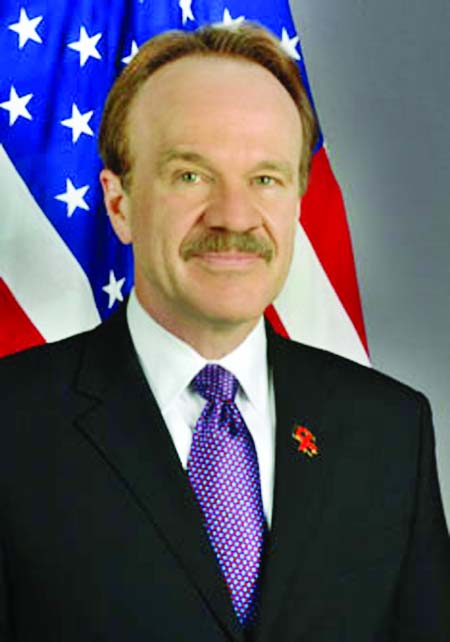
UNB, Dhaka :
US Ambassador in Dhaka Dan W Mozena on Wednesday said justice traditionally has relied largely on confessions by perpetrators in Bangladesh and throughout South Asia which invites abuse as the agents of justice have a great incentive to force confessions from alleged perpetrators leading the courts to throw the case out.
“The result often is a miscarriage of justice for all
concerned, thus eroding public confidence in the justice process,” he told a seminar titled ‘Mass Casualty Forensics Death Investigations’ at the Detective Training School, CID in the city.
The US envoy, however, applauded the government of Bangladesh’s determination to advance the nation’s justice system to one based on evidence – clear, unbiased, straightforward evidence that provides a legitimate basis for convictions and the delivery of justice.
He wished for all-policemen and women, firemen and women, forensic specialists, prosecutors, judges – saying ‘the very best as you explore together as a team how best to strengthen Bangladesh’s system of justice so all citizens have ever greater confidence that the state can deliver timely, fair and impartial justice to all.’
Mozena said, delivering such justice is a difficult task as the state must ensure justice to the victim, to the alleged perpetrator of a crime, and to society as a whole. “All must have confidence in the system of justice.”
If the state fails to provide effective justice, then citizens often will lose faith in the justice system and will resort to vigilante justice, when the citizens take the law into their own hands, he said adding that this is a breakdown of the justice system and is not compatible with democracy.
Inspector General of Police Hassan Mahmood Khandker, Detective Training School Commandant M Shahadat Hossain and Additional Inspector General M Mokhlesur Rahman, Chief of Criminal Investigation Division were also present.
US Ambassador in Dhaka Dan W Mozena on Wednesday said justice traditionally has relied largely on confessions by perpetrators in Bangladesh and throughout South Asia which invites abuse as the agents of justice have a great incentive to force confessions from alleged perpetrators leading the courts to throw the case out.
“The result often is a miscarriage of justice for all
concerned, thus eroding public confidence in the justice process,” he told a seminar titled ‘Mass Casualty Forensics Death Investigations’ at the Detective Training School, CID in the city.
The US envoy, however, applauded the government of Bangladesh’s determination to advance the nation’s justice system to one based on evidence – clear, unbiased, straightforward evidence that provides a legitimate basis for convictions and the delivery of justice.
He wished for all-policemen and women, firemen and women, forensic specialists, prosecutors, judges – saying ‘the very best as you explore together as a team how best to strengthen Bangladesh’s system of justice so all citizens have ever greater confidence that the state can deliver timely, fair and impartial justice to all.’
Mozena said, delivering such justice is a difficult task as the state must ensure justice to the victim, to the alleged perpetrator of a crime, and to society as a whole. “All must have confidence in the system of justice.”
If the state fails to provide effective justice, then citizens often will lose faith in the justice system and will resort to vigilante justice, when the citizens take the law into their own hands, he said adding that this is a breakdown of the justice system and is not compatible with democracy.
Inspector General of Police Hassan Mahmood Khandker, Detective Training School Commandant M Shahadat Hossain and Additional Inspector General M Mokhlesur Rahman, Chief of Criminal Investigation Division were also present.

